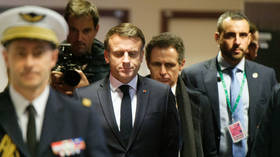
The French president is trying to exercise minds in Western Europe to understand that they can no longer rely on the US as a security guarantor

By Fyodor Lukyanov, the editor-in-chief of Russia in Global Affairs, chairman of the Presidium of the Council on Foreign and Defense Policy, and research director of the Valdai International Discussion Club.
By Fyodor Lukyanov, the editor-in-chief of Russia in Global Affairs, chairman of the Presidium of the Council on Foreign and Defense Policy, and research director of the Valdai International Discussion Club.
Russia in Global AffairsRGA on Telegram

French President Emmanuel Macron is walking to a media briefing at the end of an EU Summit in the Europa building on February 2, 2024 in Brussels, Belgium. © Getty Images / Getty Images
Emmanuel Macron alarmed the “collective West” this week by speculating that NATO forces could be openly deployed in the Ukraine conflict zone. Over the following three days, various allies distanced themselves from the French president’s words, assuring everyone that there were no such plans. Macron is known for his penchant for making loud statements with little substance behind them, and it is easy to attribute this episode to that sort of tendency.
But there is a more complex explanation. Macron is unwittingly playing the role of Western Europe’s “collective unconscious,” anxiously searching for a foothold against a backdrop of changing circumstances.
Talk of strategic autonomy in the Old World remained empty for decades because it was treated as an accessory, necessary only for the sake of solidarity. Otherwise, Western Europe was content with a situation in which it did not have to worry about such matters. Partly because of American guarantees but mainly because of the absence of any threat. The year 2022 brought troubles of a threefold nature.
First, the terrifying specter of what they see as Russian revanchism. Second, the fact it was Western Europe that bore the economic cost of combating Moscow. Third, no matter what is proclaimed at summits, the reality that domestic priorities are pulling the US away from Europe.
The Old World has been bickering with America over defense spending for years, and responding with cosmetic measures. Again, because it did not believe in the threat. When that began to change, the question of spending and capabilities did not arise for the US, but rather for the European part of the trans-Atlantic alliance. The Americans do not really care how the Ukrainian battle ends, and they can afford to deal with other matters –domestic ones– in parallel. The latter are obviously more important, and the financing of Ukraine is becoming their hostage. In Western Europe, the fear of war with Russia has already been so promoted by the top brass that it is beginning to determine everything else.

Read more
When the Western community is mobilized to confront “autocracies” (Russia is joined by China in this narrative), it is foolish to raise the question of European strategic autonomy. But such a capacity is becoming a necessary condition for Western Europe’s relevance. Hence the attempt to redirect consciousness from the priority of social comfort to the imperative of security.
The conditions for success are not very favorable. The population is used to tranquility. The collective lack of quality in their elites also reduces confidence in their ability to manage the strategic approach. But firstly, it is precisely this that increases risks, as it fits into the popular meme of “dementia and courage,” especially when a mild panic is added. Secondly, one should not draw conclusions from clumsy approaches, such as Macron’s statements or the musings of EU diplomacy chief Josep Borrell.
Behind the cartoonish façade are discreet changes in the approaches of countries (or individual segments of societies) that retain the ability to think in terms of effective confrontation. And which recognize that the US agenda is changing, probably irreversibly.
Here, the British build-up is a clear example.
Gunpowder is sometimes preserved in powder chambers that have long since been turned into souvenirs. If it is not there, so much the better, but it is more useful to overestimate the enemy than vice versa.
This article was first published by Kommersant, translated and edited by the RT team




